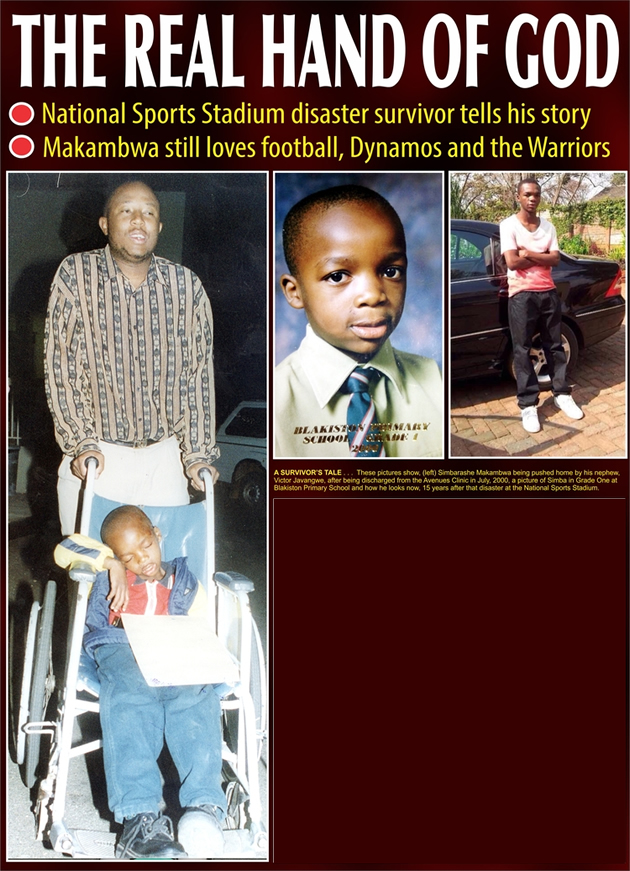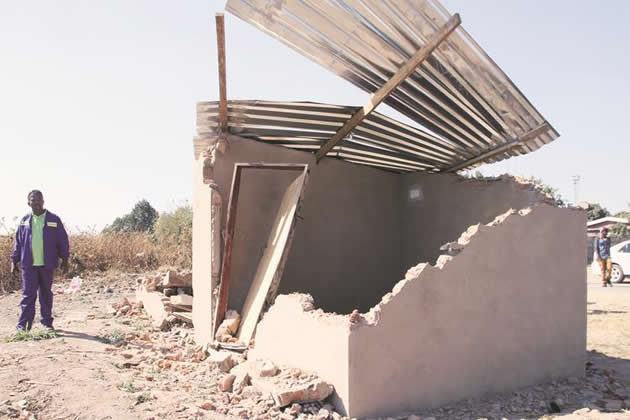The real hand of God

 Robson Sharuko Senior Sports Editor
Robson Sharuko Senior Sports Editor
HIS name celebrates the power of God and Simbarashe Makambwa believes he needed divine help to emerge out of the stampede at the National Sports Stadium, on July 9, 2000, with only physical and psychological scars and live to tell his story, 15 years later.
A stricken Simba became one of the enduring images of the survivors of the worst sporting tragedy to hit Zimbabwe sport, after his photograph, being pushed on a wheelchair on the day he was discharged from hospital, was published in this newspaper.
The damage that had been inflicted on his young body, under that human crush, was there for everyone to see as his nephew, Victor Javangwe, a medical doctor, pushed him in that wheelchair, as they left the Avenues Clinic in Harare, heading home.
He was two weeks short of his sixth birthday, a Grade One pupil at Blakiston Primary School, who had gone to the giant stadium with his parents on July 9, 2000, to cheer their beloved Warriors, before fate turned what was supposed to be a memorable family outing, into an adventure made in hell.
Simba was one of the lucky ones to survive, but 13 of his fellow countrymen and women, sadly, didn’t make it, crushed to death in that stampede, as the National Sports Stadium turned into a death cage, in Zimbabwe football’s darkest hour.
And, until yesterday, he had never shared his miraculous survival tale with a country that first saw him slumped in that wheelchair, visibly in pain and appearing disoriented, as his uncle pushed him home after he had spent time in hospital.
It has taken 15 years and, maybe, the transformation from a boy into a young man, now on the verge of his 21st birthday, for Simba to gather the courage to confront the demons of July 2000 and speak about a very dark day when his life was on the edge.
He is now a student at the University of Cape Town where he is studying actuarial science, a member of the college football team and says the events that day did not dilute his love for the game nor his support for his beloved Dynamos and the Warriors.
Understandably, he doesn’t remember a lot about what happened after pandemonium broke out at the National Sports Stadium on July 9, 2000, towards the end of the 2002 World Cup qualifier between Zimbabwe and South Africa.
“I only remember running, trying to get to the exits, when teargas spread into where we were sitting and there was a lot of pushing and shoving and I fell and my parents appeared to fall on top of me and people were just stamping on us as they tried to get out of the stadium,” said Simba.
“I lost consciousness and I had cuts and bruises and I don’t remember much after that, but I recall that when I regained consciousness, one guy then pulled me and he took me to his car and, after about two hours or so, I then saw my dad, who had been looking for me.
“That’s when I was taken to the hospital, I was still very young, and didn’t understand a lot of things, I was only in my second term as a Grade One pupil at Blakiston, but when I got older, it then really hit me that things could have gone very, very bad for me that day.
“My mum was also injured, during that stampede and spent more time in hospital compared to me and was not released until two weeks after the incident.
“I am a very spiritual guy and I pray a lot, when I reflect, I take a moment to thank God that I am fortunate that I am still alive today because it could all have ended that day in that stampede.”
Just as well, tragedy didn’t strike the family that day.
For Simba is the only child.
He remained at Blakiston Primary until Grade Four, when his beloved Warriors finally ended their lengthy wait to qualify for the Nations Cup finals, going to stay in Canada with his family and spending about five years outside the country.
When he returned home, he went to Watershed where he passed his O’ and A’ Levels, before getting a place at the University of Cape Town.
And, all this time, he never lost his passion for football, both as a player and a supporter, although he has only been back to the giant stadium once, since that disaster, when he watched the friendly international between the Warriors and Brazil in 2010.
“Football has always been part of me and when I was young, about four or five, dad would take me, just about every week, to the stadiums, to watch my team, Dynamos, of course and the Warriors,” said Simba.
“I am still following how Dynamos and the Warriors are doing although I don’t go to see the two teams as often as I used to do as a child, but they remain my teams.
“I also play football, as a central midfielder, although I know that in this game, if you were not lucky to get some scouts seeing you when you were young, you don’t get the chance to become a professional and that is why now, all my focus is on my studies.
“I am turning 21 on the 26th of this month and I am just thankful to the Lord that I am alive because others, who found themselves in my situation on that day in 2000, didn’t get a second chance and that makes you realise how lucky you are.
“I am the only child in the family and I want to make the best of the second chance that I received.”
Simba returns to college next weekend and on the 15th anniversary of the day when all hell broke loose at the National Sports Stadium, he knows he is a very lucky young man to have survived that disaster and lived to pursue his dream.
A year to the 30th anniversary of Diego Maradona’s ‘Hand of God’ at the ’86 World Cup finals, when his cheeky goal, scored by a hand, knocked England out of the quarter-finals in Mexico, people like Simba know the Real Hand of God when they see one in action.
And, as they reflect on the events of July 9, 2000, wondering how they lived through it all and got another chance to pursue their dreams, they will tell you that they have seen the Real Hand of God in action.
Maybe, that is why his parents celebrated the power of God in his name.









Comments